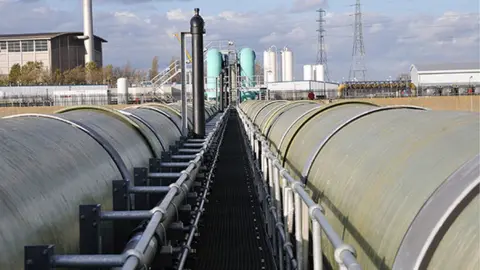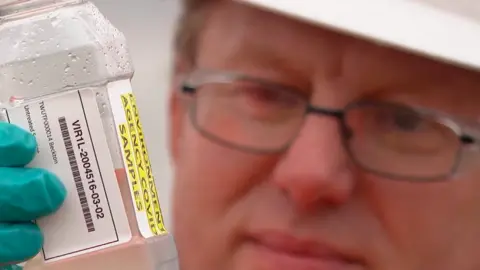Covid: Sewage sites to test for more traces of virus
 Thames Water
Thames WaterNinety wastewater treatment sites in England, Wales and Scotland will start testing more sewage for coronavirus.
The aim is to create an early warning system to detect local outbreaks before they spread.
Scientists established earlier this year that fragments of the virus's genetic material could be identified in human waste.
A successful trial in Plymouth has detected a cluster of infections in the local area.
And scientists in Scotland have found evidence of the virus in waste water samples from most of its health board areas. The results are consistent with areas where there are confirmed cases of Covid-19.
Crucially, virus fragments can be detected even when there are only asymptomatic Covid-19 cases in the community.
The project is a collaboration between central and local government, along with academic institutions and water companies.
Prof Davey Jones, an expert in soil and environmental science at Bangor University, was one of the researchers to get involved.
He said: "We have been monitoring viruses like norovirus and hepatitis in human sewage for the last decade. We added Covid-19 to the list in March this year."
His team discovered that viral levels in wastewater tracked the success of lockdown measures during the first wave.

Waste from sites such as Beckton Sewage Treatment Works in East London, will be tested four times a week from now on.
Results of the analysis will then be shared with test-and-trace systems in England, Wales and Scotland - helping them focus on particular communities for extra attention, as well as tipping off local NHS services.
Successful pilot
Scientists had to overcome some tricky issues to refine the technique, not least that wastewater - by its nature - contains a lot of contaminants and samples vary widely, which makes it tricky to develop a one-size-fits all standard, accurate test.
But a pilot in south-west England has already helped to spot a rise in infections that occurred last month in Plymouth, where a cluster was silently growing as a result of several asymptomatic cases.
The levels of the virus's genetic material in the wastewater acted as an invaluable early warning system.
"Levels were very low during the summer and then in September there was a sudden spike," said Environment Secretary George Eustice.
"That enabled local health officials to try to identify where around Plymouth there might have been a particular problem, even though the test-and-trace system hadn't shown it up at that point."
Mr Eustice acknowledges these waste tests are not a substitute for an effective test-and-trace regime, but he describes it an "added tool in the box".
Roseanna Cunningham, the Scottish government's Environment Secretary, said: "The early data is already providing our public health experts with new information, which complements the wider population testing programme to give a more robust picture of the prevalence of Covid disease in Scotland."
For the moment, the testing will be done at water treatment works, but the hope is that sewage tests might become even more localised over time - perhaps down to individual postcodes.
The technique is already being used elsewhere in the world. The University of Arizona in the US, for example, tests waste from its student residences twice a week.
Britain is also looking to advise developing countries on the practicalities of this method, as many low-income countries do not have enough testing machines for their populations.



